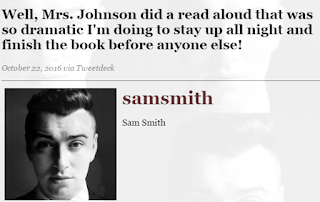I've been fairly active on Twitter for a few years, but two years ago, something happened that enhanced my professional learning exponentially. I joined Voxer. (I wrote about this
previously.) At first I spent much of my time in the #
BFC530 Voxer group (and I still belong), but now I spend the most time in #EduMatch. This is a community that is supportive, funny, thoughtful, and provocative. We mainly talk about education matters, but there are times.... Members truly are international, including "regular" contributors from Canada and Argentina, with occasional posts from countries such as Singapore, Greece, and more.
Why do I call
EduMatch an empire? Because it can be just about anything for anyone. Check out the many ways you can be connected. (There is even a
ThingLink by
Rachel Pierson that will take you to the relevant sites.)
Not only Head #EduMatch Guru
Sarah Thomas maintain these websites, she also manages a 6 pm ET "
Tweet & Talk" almost every Sunday! Countless people have been involved, either as panelists, Google Hangout attendees, or tweeters.
#EduMatch has led me to smaller groups where I felt comfortable taking risks to learn about new tools; I'm in Voxer groups for Periscope, Snapchat, and several book clubs with people I "met" on #EduMatch. Many #EduMatch participants have been empowered to participate in several large scale events, such as #EdCampVoxer, #PasstheScope, #NotatISTE, and more.
So, ultimately, the climate at #EduMatch is just like what we want for our students: a group that is varied in (tech) abilities and interests, yet can find common ground, be supportive, encourage risk-taking, not belittle anyone's questions (or criticize someone asking the same question that has already been asked numerous times before). There is pure joy when members meet each other F2F at various conferences. One feature of Voxer is that you can star an post to keep later. Here's a portion of one from Dan Kreiness
"EduMatch should have a banner, or something made: 'EduMatch, where you can have awesome conversations related to deep topics such as civil disobedience and social justice...and then switch to a conversation about printer ink, so seamlessly. I just think that's great.'"
If you have any questions about #EduMatch or any of the tools I've mentioned, don't hesitate to contact me!












